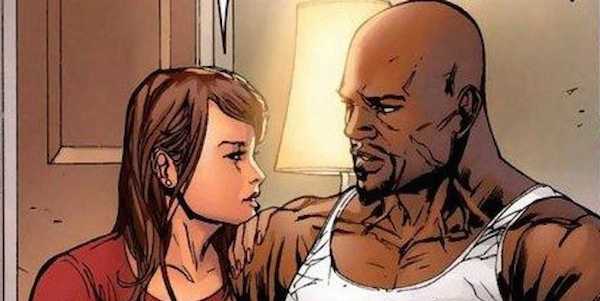When news first broke that Marvel’s Jessica Jones was being adapted to a live-action show, I was ecstatic. I practically ran to my nearest bookstore to get my hands on a copy of ALIAS: Jessica Jones in preparation, and the trailers only added to my excitement. I was enamored by the image of a female anti-hero, eyes steady with a determination to accomplish her goals and get the bad guy—not for the greater good of humanity, but for herself—without worrying about what she’s wearing or having a love interest.
I’ve since watched every episode of Jessica Jones, and most of my initial excitement stands true. It’s a well-written show that accurately presents real-world issues that many women can identify with as sexism and abuse has turned digital, but seeing how well-integrated these issues were only adds to my frustration when it comes to the way that the show handles race. Quite frankly, Jessica Jones leaves much to be desired when it comes to tackling issues of race, even when it excels in tackling sexism and digital-age abuse.
The Marvel “heroes-for-hire” shows that are taking over everyone’s radar in superhero media pride themselves on building a world akin to ours. The Hell’s Kitchen that we are presented with is as gritty and unforgiving as the one in real life New York City, yet the consistent comics problem persists; even in one of the most multicultural hubs in the world, we’re presented a world that highlights few men of color and even fewer women of color. Jessica Jones, a show that passes the Bechdel test almost effortlessly, only employs a handful of people of color to its roster: neighbor Malcolm, love interest Luke Cage, and Luke’s (now deceased) wife Reva.
To be fair, the show is from Jessica’s perspective, and though she is compelling as an unlikable heroine, her whiteness works as a way to assimilate her—even in this modern Hell’s Kitchen. By contrast, the few people of color that we interact with are immediately set up as her opposites. What’s even more frustrating is the lack of nuance that comes with discussing complex issues of identity along with race. Because we view this world through Jessica’s lens, it’s expected that we gloss over discussing race because, well, it’s not Jessica’s focus. As a white woman, we give her that leniency despite the prominence of race when it comes to how we view and interact with the other characters of color who do get time in the spotlight.
As far as comic couples go, Luke Cage and Jessica Jones are one of my favorites. Their interactions are more realistic than others, and it’s refreshing to see a character like Luke—a dark-skinned, physically attractive Black man—be the one that initiates romance and intimacy. However, even this interaction flirts with the negative racial undertones that often come along with nonwhite partners. We’re meant to view Luke as eye candy, and while the other love interest in the show (Trish’s Simpson) is seen in a similar fashion, we don’t get the same leering feel. The one time that the show tries to address race in a conversation between Jessica and Luke, it’s brushed aside as an awkward joke that doesn’t get full closure.
During the course of the show, Jessica stalks Luke out of guilt from killing his wife while under the control of antagonist Kilgrave. Throughout the season, we’re greeted with Jessica’s flashbacks of murdering Reva—the same image of the show’s lone Black woman, being punched in the chest and left for dead on the pavement. The show works to bring use to sympathize with Jessica, our antihero, over Reva; much like Rue in Hunger Games, Reva Cage initiates the major movement of the story, yet her major recognition remains in being a Woman in a Refrigerator.
It could be argued that Jessica Jones is not malicious in its lack of proper nuance in its characters of color—it would be unfair to place that responsibility on a show that tackles other issues so boldly. Besides, with Luke Cage’s upcoming solo series, we have the chance to have a proper address of race in the Marvel Cinematic Universe—especially with the introduction of Misty Knight. However, it’s because of Jessica Jones’ exploration and thrilling performance of sexism and surveillance in the digital age that leaves me feeling disappointed. The show has proven that it can handle more, so why does it stop short?
I still believe that Jessica Jones is a show worth watching. It’s a show that brings together veteran superhero fans and newcomers, even attracting viewers that may not be “into” superhero media at all. It’s also one of the most promising Marvel live-action shows that have debuted over the last decade, bringing us more evidence to the already familiar fact that female-led action media can be just as powerful as typical male-led media. However, it’s Jessica Jones’ failure to properly and accurately tackle race and how it relates to the show’s thread of mixing action with intellectual societal issues. What Jessica Jones left unaddressed was a disservice to the show’s otherwise stellar contemporary commentary, and I think that as our culture continues to progress, we know that we owe ourselves more.
(image via Marvel Comics)
Cameron is a writer, activist, and professional fangirl from New Jersey. She is committed to shifting ideas of diversity in nerd culture and SFF, one Internet rant at a time. Her work can be found on her blog, as well as various other places online. You can also find her on Twitter.
—Please make note of The Mary Sue’s general comment policy.—
Do you follow The Mary Sue on Twitter, Facebook, Tumblr, Pinterest, & Google +?









Published: Dec 7, 2015 02:41 pm